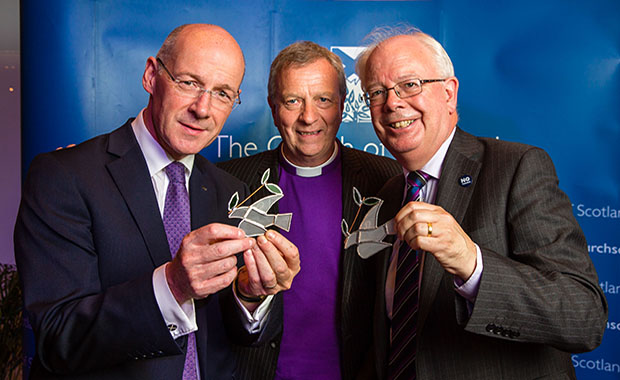Scotland 'in danger of becoming a divided country': Church shifts its focus to reconciliation

After a shock poll put the 'Yes' and 'No' campaigns on Scottish independence neck and neck, the Church of Scotland has revealed its concerns about the tone of the debate and the possible damage being done to community relations.
With the prospect of independence now just around the corner, David Cameron, Nick Clegg and Ed Miliband are all hitting the campaign trail in Scotland in a last ditch attempt to convince voters that together is better.
While much of the debate has centred on economic considerations and relations between Scotland and the rest of the UK, the Church of Scotland fears divisions within the country may become entrenched as the two sides ramp up efforts to swing the vote their way on September 18.
Writing on the Church of Scotland website, Moderator John Chalmers welcomed the level of public engagement in the independence debate but said aspects of the campaign had been "deeply unpleasant".
He told of one elderly woman who reported having a No Thanks poster daubed with obscenities pushed through her letter box. Her house happened to be next to the lamppost it had been torn down from.
Labour MP and former Scottish secretary Jim Murphy suspended his speaking tour after being pelted by eggs by an independence supporter, and Alex Salmond has reportedly received death threats.
Others are "too fearful of broken windows to put campaign notices in the windows of their car or house", Mr Chalmers said.
The Moderator appealed to both sides to keep their actions civil as he warned that the "shouting down" by a minority could "if left unchecked ... disrupt the majority".
"This debate started with two sides - one making a case for Yes and the other making the case for No; now each has become a cause and that's what makes me nervous. Both sides have to get the tenor of the debate under control," he said.
But the concern is equally directed at the politicians fronting the campaigns, as Mr Chalmers admitted his "heart sank" watching the heated televised debate between Alistair Darling and Alex Salmond.
"We do not need heat that is searing and unpleasant as we enter the closing stages," he said.
"I believe it is not too late to make sure that in the aftermath of the referendum there is no 'us' and 'them' but only 'us'."
The Moderator's comments follow polls on the referendum in the last week putting the Yes campaign in the lead for the first time, and revealing concerns about the possible fallout of a Yes or No vote. A poll by The Times found that half of Scots believe there will be remaining bitterness and division after a Yes vote, while 55 per cent believe the same of a No vote.
Mr Chalmers continued: "If we do not behave respectfully to one another in the run up to the 18th September, what on earth makes people think that we will behave differently on the 19th September? Scotland may be in danger of becoming a divided country for some time to come."
Whatever the outcome, he said there was a need to "avoid triumphalism" and "manage expectations" while the result of the referendum is digested.
"If the vote is 'Yes' then there is likely to be a protracted period of negotiation about the terms of separation for Scotland and the rest of the UK," he said.
"If the result is No then a period of debate will begin about what, if any, additional powers might be devolved from Westminster to the Scottish Parliament. During these uncertain times it will be important for Scottish society to be cohesive, and for the discussions to be positive and constructive."
To foster harmony in the immediate aftermath of the referendum, the Church of Scotland will be holding a service on the first Sunday after the vote in Edinburgh's St Giles' Cathedral.
The Kirk is also lending its support to Collaborative Scotland, a grassroots initiative that was started to foster respectful dialogue around the independence issue.
Mr Chalmers proposed the Yes and No campaigns work together on promoting a "positive, conciliatory agenda" on social media in the days after September 18. He suggested simple measures like asking supporters to take a 'selfie' with someone who voted the other way, or using joint hashtags that celebrate the referendum and cooperation.
"[Online] is where much of the antagonism in the referendum debate has occurred so this is where much of the repair can be done," he said.
"Whatever the outcome I know which tone I want to hear on the 19th of September and whatever the outcome, I want the key institutions both in Scotland and across the UK actively to demonstrate a willingness to work together."
Read his comments in full here











